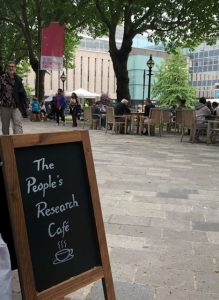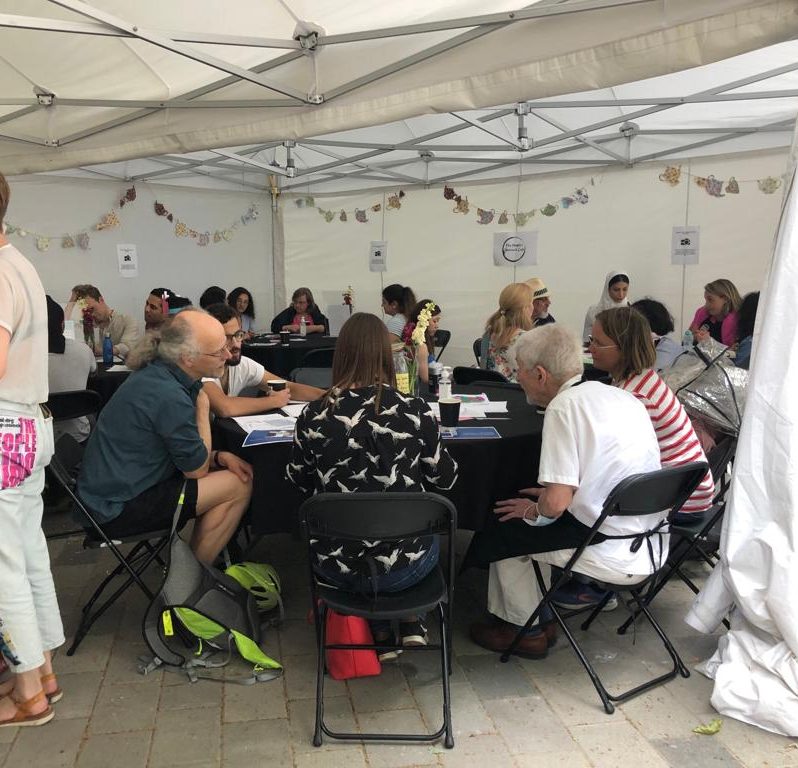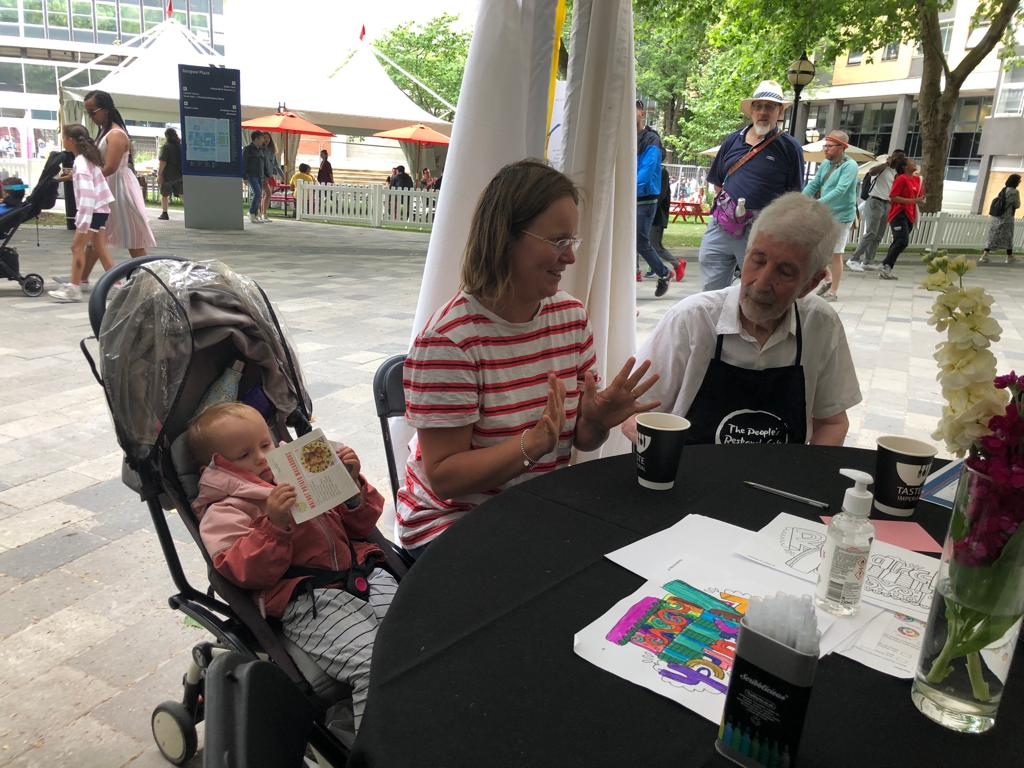- Understanding the relationship between diet and gut health
- Understanding the impact of digital technologies on patient safety
- Developing an alternative to blood tests for health investigation through a microneedle biosensor device
- A coffee for your thoughts: How and when can we personalise medicine?
- Analysing patient feedback to improve patient-centred care
- Artificial Intelligence in healthcare: exciting but complex
- Can a daily food supplement prevent weight gain?
- Developing a new technology to diagnose a virus that can lead to disabilities in new born babies
- A great day on Great Exhibition Road!
- Bringing together experts in public involvement, researchers, public partners, and the public to improve early-stage research projects
- Understanding the role of gut hormones on appetite and eating behaviour
This blog is part of a series showcasing the People’s Research Cafe which took place on the 18th and 19th June 2022 in South Kensington, London as part of the Great Exhibition Road Festival.
What is a People’s Research Café?
The People’s Research Cafe is a café with a twist. Visitors are welcomed to sit down at a table co-hosted by an Imperial College researcher and a public contributor whose role is to help the conversation flow freely. Over a free hot drink, visitors find out about the researcher’s project and will be asked for their opinions on it. The researchers are then expected to use this feedback from visitors to improve their projects. The People’s Research Café has been run previously at two Imperial Festivals (2018 and 2019) and also in four community venues. It was previously called the “PPI Café” and you can read about the one at the Imperial Festival 2018 here.
When did this People’s Research Café take place?
A People’s Research Café was hosted at the Great Exhibition Road Festival held on 18 and 19 June 2022 and was a collaboration between the following teams/centres: Imperial Biomedical Research Centre, Imperial Clinical Trials Unit, Imperial Clinical Research Facility, London In-Vitro Diagnostics Cooperative, North West London Applied Research Collaboration, MRC Centre for Environmental and Health, HPRU in Healthcare Associated Infections and Antimicrobial Resistance. Researchers from each centre were given the opportunity to apply to host a table at the Café for 2 hours where they would explain their research in plain language and ask visitors 3 questions with the help of a public contributor. It was a requirement that the research project was at a stage where visitor feedback could still influence the project. Researchers and public contributors were offered training about how the Café would work and how to maximise conversations with visitors. Ahead of the Café, researchers refined their plain language summaries and three questions to pose to visitors with the help of public involvement leads and a public contributor.
In conversation with:
- Keitumetse-Kabelo Murray, Patient and Public Involvement Manager, ARC NWL Patient, Public Community Engagement and Involvement
- Kimberley Foley, Research Associate, ARC NWL Child Population Health, Department of Primary Care and Public Health
- Barrie Newton, Public contributor
Kabelo, as an expert on Patient and Public Involvement and Engagement how would you describe PPIE and the importance of its role in research?
“Patient and Public Involvement and Engagement” (PPIE) is, perhaps, an overly complicated term for a straightforward concept. The National Institute for Health Research defines PPIE as “…conducting research ‘with’ and not research ‘on’ patients and members of the public.” The term itself is a perfect example of how research and the Academy (the broader academic world) create structures that are inaccessible to those who are often the ‘main characters’ in a piece of research. The aim of PPIE is to engage and include patients and members of the public to create and own knowledge, but the term doesn’t encompass its core values of inclusion, the rebalancing of power, accessibility and representation.
At its core, PPIE is a tool through which we bring those who have lived experience to the centre of the research we conduct to understand that lived experience. Effectively, PPIE is providing a platform for ‘the main characters’ to write their own lines, about their own lives, in the way that they want. PPIE focuses on letting those who live a story, tell that story. In doing this, we create space for this story to be told with greater empathy, understanding and perspective while also encouraging rigour and accuracy – key aspects to quality research.

What were each of your roles at the People’s Research Cafe?
Kabelo: At the People’s Research Café I would approach members of the public and begin engaging with them about Cafe, PPIE and why these approaches were important (both to the researcher and the public). This would lead into discussions on what the researchers were aiming to do, the research projects that were available as well as what personal interests the members of the public had. This initial engagement enabled me to best pair up the members of the public with a research team and I would then invite them into the People’s Research Cafe and introduce them to the team. This demonstrates a snapshot of how PPIE interacts on a small scale while still having significant engagement and lasting impact. Through the People’s Research Cafe we were able to bring members of the public into the research and thus partially bridging the gap between researchers and patients.
Kim: I brought a research project to the People’s Research Café for discussion with public visitors.
Barrie: As a lay person, with no background in any kind of science, I was very pleased to join in the Research Café and to support the researchers as they involved members of the general public in their projects. I saw myself as a link between the researchers and those who dropped in for a coffee and a chance to discuss research projects at first hand. I introduced the researchers by name and invited them to explain to the visitors (a) what their project was aiming to do and (b) how the visitors could give practical help. My aim was to keep the conversation going and also to keep it “on track”, as some visitors had specific general questions which didn’t actually relate to the projects under discussion. I also encouraged the visitors to comment on specific issues raised by the researchers and, where appropriate, to list the issues in order of importance.
Kim, what research project did you bring to the People’s Research Café and what is it about?
I brought my project examining the impact of covid-19 pandemic lockdowns on children’s respiratory (throat, lung and airway) infections to the People’s Research Café. The pandemic lockdowns, although intended to reduce the spread of covid-19 infections, also reduced the spreading of other viruses that cause respiratory infections. We are planning to use electronic health care records from GP practices in England to look at the impact of covid-19 pandemic lockdowns on children’s respiratory infections and I was very interested in hearing about children’s experiences during lockdown from parents/carers. Previous reports showed that children’s respiratory infections greatly decreased during lockdown, and we predicted that this may impact on their future health, but there were many different research questions we were considering exploring. I wanted to hear from parents/carers and other members of the public about what mattered most to them in relation to my proposed plans and to gather their views on the importance of my research questions.
What questions did you ask visitors to the People’s Research Café about your project?
First, I asked about the visitor’s (or their children’s) experiences with respiratory infections during lockdown and whether this changed as restrictions decreased. Then, I asked about what they were most interested in learning from our research project by presenting four possible areas and asking them to discuss and vote for the one they were most interested in:
- Whether the types of throat, lung and airway infections children got in 2020/2021 has changed from previous years?
- Whether the infections children got in 2020/2021 were more serious than they were before?
- Whether the number and types of throat, lung and airway infections children got was different for babies born in March 2020, but then things returned to “normal” in their second year of life?
- Following these children to see what happens with their health as they get older?
Finally, I asked for their views on the importance of this research topic.
What did visitors tell you?
Visitors told me of their experiences during lockdown. Those who had their own children felt that the information we provided in the introduction to our project reflected their experiences; that children did not get respiratory infections during lockdowns, but this changed when lockdown eased (especially when children returned to school/nurseries).
We discussed what they were most interested in learning from this research project by reviewing the 4 possible research areas:
1. Whether the types of throat, lung and airway infections children got in 2020/2021 has changed from previous years?
2. Whether the infections children got in 2020/2021 were more serious than they were before?
The visitors were generally not interested in learning about whether the usual types of respiratory infections in early childhood had changed before/after pandemic lockdowns, but many expressed interest in knowing whether the severity of infections had changed.
3. Whether the number and types of throat, lung and airway infections children got was different for babies born in March 2020, but then things returned to “normal” in their second year of life?
Some visitors were also very interested in learning about whether children born during the pandemic lockdowns who may have missed out on some of the typical respiratory infections would “catch up” on these later. However, some of the visitors felt this was not a topic of interest as it was clear to them this is what occurred with their children or children they knew – they felt things had returned to “normal” in terms of patterns for respiratory infections in early childhood so they didn’t feel that this was something of importance to study.
4. Following these children to see what happens with their health as they get older?
Most visitors felt this was a very important area to study. Parents/carers and other visitors expressed concern about whether the pandemic lockdowns and possible changes in the frequency and timing of respiratory illnesses may affect children’s future health.
The discussions at the People’s Research Café confirmed for me the importance of this research question, and also confirmed the critical importance of explaining to the public, “why does this matter?” In answering the third question, many visitors discussed how lockdowns due to the covid-19 pandemic are hopefully a thing of the past, so they wanted to know how our research about the impact of covid-19 affect how things are done in future.
Barrie’s contributions to this part of the discussion were extremely helpful in terms of engaging the public visitors and he would ask important questions to help assist in translating my scientific language into more appropriate lay language for the public.

How will what visitors told you impact and/or change your project?
Our discussions around the different possible research questions have allowed me to prioritize what I will explore first in this research project. The public also expressed great interest in following this group of children forward to see the potential impact on their future health, which is something I was already interested in doing, but this helps motivate me to pursue it further as it matters to the public.
The discussions with the public about “why does this matter?” were very useful to me as a researcher. In the initial development of my project I had similar questions about what the expected impact/value of this work might be. The conversations with the public helped to strengthen and clarify my arguments and thinking around this.
What was your personal experience of taking part in the People’s Research Café?
Kim: This was a fantastic event. In a two hour “cafe shift” I was able to get an incredible amount of public involvement and engagement on my project. The views from the public have helped me refine my plans for the study and through our discussions, I was able to refine my thinking and better communicate the importance and relevance of my work to the public. I would highly recommend this event to other researchers in future!
Barrie: I found the whole experience enjoyable. It’s always stimulating to listen to others talking about what interests them, especially when I knew nothing about the subjects in advance. I think the presence of a “lay contributor” encouraged the visitors to share their views and to understand that there are no “silly questions” in a situation like this. Both sides were learning.
Of course, these sessions help scientists to understand which kinds of research are seen by the general public as valuable.
Finally, I realise the importance of research, especially in healthcare, and I felt privileged to be playing a (very) small part in helping to advance the knowledge in this area.
Kabelo’s reflections on the People’s Research Cafe
The People’s Research Café facilitated essential characteristics of a co-produced approach to research. The NIHR defines co-production as the sharing of power in research through the development of relationships that are built on mutual trust, transparency and the acknowledgement of contributions – all of which were utilised and encouraged in our expression of the People’s Research Café. The People’s Research Café demonstrates how these principles can be held at the center of a research programme while simultaneously enhancing the quality of the research as well as building relationships thus lessening the distance and differences between researchers and participants/members of the public.
We are observing a shift towards more researchers using PPIE as a model for building research projects, more and more communities are formalising their own understanding of their lived experiences through conducting their own research and more funding is being directed towards these types of projects. These are positive shifts that both feed into and demonstrate the process of breaking down the hierarchies of power that have kept the Academy and the public separate. Through the People’s Research Café we are able to demonstrate a movement towards a research culture that favours co-production as a model of connection and understanding.
